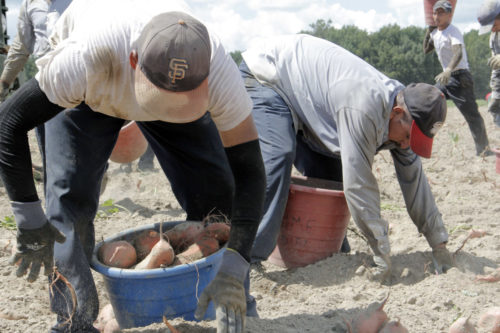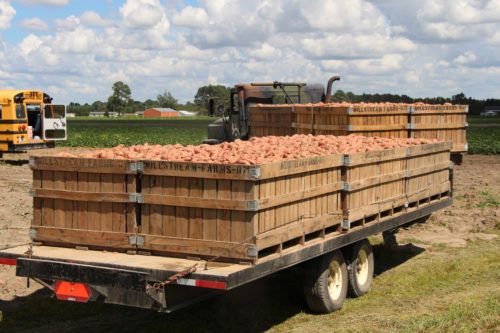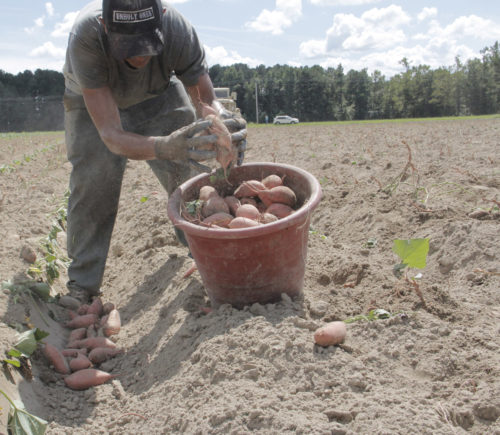Ministry serves farmworkers through sacraments, outreachPosted Oct 10, 2014 |
|

Farmworkers wear long pants, sleeves and gloves to work in the fields partly to protect themselves from pesticide exposure. Photo: Lynette Wilson/ENS
[Episcopal News Service – Newton Grove, North Carolina] On a rainy, humid mid-September morning five hours before the Sunday noon Eucharist at Sacred Family, the Rev. Tony Rojas got behind the wheel of a white van and began making the rounds to pick up men from the farmworker camps set back on highways and county roads among the single- and double-wide trailers and more stately brick homes of rural North Carolina.
He picked up men like Abraham Cruz, 47, of Tlaxcala state in east-central Mexico, who for the last seven years has traveled to the United States on a temporary agricultural worker visa to work eight- to 12-hour days in the fields planting and harvesting cucumbers, watermelons, tobacco and sweet potatoes. Cruz’s earnings go to support his family in Mexico, whom he sees two to three months a year.
Over the past 18 years, Rojas has built up the Episcopal Farmworker Ministry, a joint ministry of the dioceses of North and East Carolina, with a 16-acre campus on Easy Street in Newton Grove. The ministry serves farmworkers in 47 camps scattered across Sampson, Harnett and Johnston counties.
The men arrive by van or decommissioned school buses early for the ministry’s free ESL classes, haircuts, immigration services and tax and legal advising, and to play soccer. Farmworkers, who spend six days laboring in the fields wearing long sleeves and pants to protect themselves from pesticide exposure, on Sundays change into shorts, jerseys and cleats, practicing for an annual daylong soccer tournament organized by the ministry.

Farmworkers typically range in age from 18 or 19 to more than 50 years old. Photo: Lynette Wilson/ENS
The ministry began in 1982 when a single outreach worker identified a need and from her car began distributing clothing and personal care items to farmworkers, then mostly Haitian migrants. Today, with its sacramental ministry that includes three mission congregations and its 20-plus outreach programs, the ministry reaches 3,500 farmworkers directly and impacts the lives of thousands more.
There are some 150,000 farmworkers, the majority of them from Mexico, working in North Carolina’s fields; some documented, some undocumented. The ministry serves them all.
Providing sacraments and outreach to farmworkers, regardless of their immigration status, is rooted in the Baptismal Covenant’s call to “strive for justice and peace among all people, and respect the dignity of every human being.”
By focusing on the sacraments and social outreach, the ministry remains “bipartisan,” said North Carolina Bishop Michael Curry during an interview with ENS in his office in Raleigh, the state’s capital. “That’s the work of Jesus that can be done by Republicans and Democrats.”
Curry has publicly called for immigration reform that would reunite families, but the church’s official advocacy for farmworker justice or immigration reform on the state level is coordinated through the North Carolina Council of Churches, of which the dioceses of North, East and Western North Carolina all are members.

Farmworkers head to the fields early in the morning picking sweet potatoes by the bucket load to fill trucks like these. Photo: Christine McTaggart/Diocese of North Carolina
Agriculture has a rich legacy in North Carolina which today ranks fifth nationally with 8.4 million acres under cultivation and more than 50,000 farms producing $11.7 billion annually in agricultural commodities. Though corn, soybeans and cotton are machine-harvested crops, 85 percent of fruits and vegetables – beans, melons, sweet potatoes, tobacco, strawberries –are picked by hand.
When members of the North Carolina Growers Association can demonstrate the local labor force is insufficient to meet the production needs of the farms, they can fill the gap through the U.S. Department of Labor’s H-2A temporary agricultural worker program. North Carolina has close to 7,000 H-2A agricultural workers, and ranks high among agricultural states using the program. (The visa program provides legal entry to work, but critics see it as a means to keep farm wages low.)
Growers can ask for anywhere between 20 and 200 farmworkers, Rojas said.
In 2000, Latinos made up 50 percent of the state’s farmworkers; today that percentage is 95, said Jennie Wilburn, a program associate with the Raleigh-based North Carolina Council of Churches.
The North Carolina Council of Churches, its history advocating for the rights of farmworkers going back decades, runs public awareness campaigns in English and Spanish and uses a Bible-based curriculum to involve the churches, said Wilburn.
Still, she said, “The political climate for vulnerable groups isn’t great.”
Wilburn said, “One thing that’s gotten a lot of attention recently is the Human Rights Watch report on tobacco.”
The 138-page report released in May documents the hazardous conditions and nicotine poisoning faced by children working in the top four tobacco producing states, including North Carolina.
Alice Freeman, who serves on the farmworker ministry’s board, knows what it’s like to work on a tobacco farm.
“I am the daughter of sharecroppers … my dad had five girls, his brother had five girls, they always farmed together, no boys,” she said. “When you grow up on a farm, a tobacco farm with cotton, tobacco, soybeans, corn, you do the work yourselves. We didn’t have brothers to do the work, we didn’t have so much money to hire other workers, we did the work in the fields; I know what it’s like to be in the fields.”
The farmworker ministry addresses a need, seeks to treat people as humans, to be compassionate. “When you are a long way from home, a friendly face, a helping hand goes a along way,” said Freeman.
(Click here for a video of Alice Freeman talking about the Episcopal Farmworker Ministry and its programs.)
In addition to working long hours under the hot sun, migrant and seasonal farmworkers often live in substandard housing sleeping on filthy mattresses or the floor; there might be a shared toilet, or an outhouse, a single shower for bathing and a washtub for laundry.

The Rev. Tony Rojas, or “Father Tony,” came to the Episcopal Farmworker Ministry 18 years ago. Rojas himself comes from the Roman Catholic tradition. Photo: Lynette Wilson/ENS
During his first three years of ministry to farmworkers and witnessing the living conditions, Rojas said he had trouble sleeping. He’d visit camps at 2 a.m. and all the lights would be on and the farmworkers would be preparing their lunches, which sometimes they’d crouch under the bus to eat to get out of the mid-day sun. He’s seen farmworkers suffering nicotine poisoning through their exposed skin rolling on the ground in agony.
Even after 18 years of working with farmworkers, Rojas still doesn’t understand how they do it, he said. Like the growers, who face the challenges of farming and often carry heavy loan burdens, farm work is a vocation. The farmworkers and the growers provide human beings with the food necessary to sustain the miracle that is life. “Without food we cannot survive, cannot keep the life,” he said.
In 1960, before Cesar Chavez founded the National Farmworkers Association bringing attention to the plight of farmworkers, broadcast journalist Edward R. Murrow, a native North Carolinian, co-produced an hour-long documentary “Harvest of Shame,” which examined the lives of migrant farmworkers and the poverty that marked their lives.
Murrow’s film depicts the lives of primarily white and African-American farmworkers; today’s farmworkers come mostly from Mexico and Central America. Otherwise, the lives of migrant farmworkers have changed little, according to a follow-up, 30-minute documentary, “Harvest of Dignity,” produced in 2011 in association with the Durham-based Student Action with Farmworkers.
Farmworkers with temporary worker status, or the seasonal workers, are guaranteed certain employee rights, their travel to and from the United States paid for, housing and food provided, and they live on the farm to which they are assigned. Seasonal workers rely on the growers to bring them back to work year after year, and can sit idle while waiting for crops to come in; undocumented workers tend to be migratory and follow their crew leaders to where the work is.
A report released in 2011 studying migrant farmworkers’ housing conditions in North Carolina conducted by the National Institutes of Health found housing standards inadequately enforced and farmworkers living in substandard conditions, with undocumented workers living in worse conditions than temporary workers.
Over the years Rojas said he’s seen some camps’ living conditions improve. And through grassroots efforts, like those of the North Carolina Council of Churches, Student Action with Farmworkers and the Farmworker Advocacy Network, more and more people in urban areas, like Raleigh, Durham and Research Triangle Park are becoming aware of the farmworkers living within 50 miles of them.
For instance, “Harvest of Dignity,” said Wilburn, led the North Carolina Department of Labor, which inspects migrant and seasonal farmworker housing, to require camps to have one toilet per every 10 and one washtub per every 30 residents.
(Jon Showalter and his family, members of Church of the Nativity in Raleigh, North Carolina, have for a decade driven the Inter-Faith Food Shuttle some 40 miles to the Episcopal Farmworker Ministry in Newton Grove, the first Saturday of every month. “It has been a blessing for our family to be involved in this ministry,” Showalter said. Click here for video of the food shuttle.)
Changing demographics
“Strong roots, new growth,” reads a sign at the entrance to Harnett County, where on one side of Highway 55 is the campus of Stoney Run Pentecostal Free Will Baptist Church and on the other is Iglesia de Dios Cristo Redentor, or Christ the Redeemer Church of God.
For the Episcopal Church, said Rojas, to have a presence in this part of the state is itself an anomaly, and building it up among the Latino population, with its Catholic roots, wasn’t easy.
“Latinos by culture and tradition come from the Roman Catholic Church, that’s the one true church,” he said. For them, a different church “means the devil is coming.
Now, however, at peak harvest, the Sacred Family mission, which meets on a concrete slab under a metal roof on the ministry’s property, is one of the largest Episcopal congregation in North Carolina, serving migrant farmworkers, families and immigrants who’ve made the state home.

Soccer has always played a strong role in Rojas’s ministry. Here on a Sunday morning farmworkers practice for an upcoming annual tournament before the Eucharist. Photo: Lynette Wilson/ENS
At 78, Rojas, a former Roman Catholic priest-cum professional soccer player in his native Colombia, maintains a youthful appearance. And when he first began his ministry in the camps, it was the soccer ball that gave him entrance, not the Bible.
“That was how I built a natural relationship with the farmworkers,” he said. After he’d gained their trust, he said, they began asking for blessings and the sacraments.
It took seven years, working for three of those years with the same 18 people.
Today, however, Rojas said, it’s understood that all are welcome and the message is simple: “Christ is our lord and savior … and to live a Christian life: love God, love self and love the other.”

It touches Father Tony to administer the Eucharist to men, like Abraham Cruz, here, with calloused hands, because in Latino culture, women are more likely to present themselves for the Eucharist, he said. Photo: Lynette Wilson/ENS
After making inroads into the Latino community and building up the farmworker ministry, for a time serving as both the sacramental minister and the ministry’s executive director, Rojas’ next priority is to fortify Sacred Family, which is housed on the ministry’s administrative campus in Newton Grove, and the two other congregations he serves, St. Joseph’s in Smithfield and St. Francis in Goldsboro.
After noon Eucharist, Rojas drives some of the farmworkers back to the camps, and then drives some 25 miles to Goldsboro for a 4 p.m. Eucharist. (Click here for a video of Rojas reflecting on his ministry.)
Since the year 2000, North Carolina’s Hispanic population has increased by 111 percent, according to a report by the Center for American Progress, a Washington, D.C.-based bipartisan, independent educational institute.
In rural schools, like Hobbton Middle School, where 12-year-old Idalia Rubio-Trejo is a sixth grader, the student body is almost half Latino, Rubio-Trejo said.
Idalia’s father is a farmworker and her mother is a homemaker. Idalia, who is fully bilingual, has three brothers and two sisters; the family has been in North Carolina for 16 years and attends services at Sacred Family on Sundays.
In addition to Rojas, the Episcopal Farmworker Ministry is staffed by Silvia Cendejas, assistant director; and Maria Acosta, an immigration specialist who annually assists some 3,000 immigrants navigate paperwork, work visa renewals and petitions for family reunification.
One need Cendejas and Acosta have identified that is not being met is to provide assistance to women in domestic violence situations. The women are confronted with three or four cases weekly, they said.

An individual farmworker on average must pick two tons, 4,000 pounds, of sweet potatoes to earn $50. Photo: Lynette Wilson/ENS
The population increase and the fact that more often farmworkers and their families are choosing to remain in North Carolina year-round has put increased demands on the ministry, said Patti Trainor, the Diocese of North Carolina’s development coordinator for the farmworker ministry.
Longtime volunteer Rolffs Pinkerton, a retired psychologist and member of Church of the Holy Family in Chapel Hill, who 10 years ago began volunteering as a translator, framed it this way: “We’re asked to serve the neediest of the neediest,” said Pinkerton, a North Carolinian who grew up in Venezuela. “And this is probably as close as you can come in North Carolina; I don’t know of a population more in need.”
To meet the demands of a growing Latino population and to continue to serve farmworkers, in 2013 the Diocese of North Carolina initiated the Harvest for Hospitality campaign aimed at raising $400,000 – double the ministry’s annual budget – by June 2015.
Robert E. Wright, who co-chairs the campaign, said Harvest for Hospitality is an investment: “They [immigrants] are a part of our community, and us, a part of theirs.
“It’s a holistic ministry, body, soul and spirit; it’s really seeing people as people, as fellow human beings. It’s empowering, not paternalistic.”
Harvest for Hospitality also aims to bring the farmworker ministry into the 21st century, said the Rev. Lisa Fischbeck, who co-chairs the campaign with Wright and serves as vicar of Church of the Advocate in Chapel Hill.
A successful campaign will not only to provide the ministry with the financial resources necessary for transformation – the hiring of a new executive director and a person to serve as a liaison between the growers and the farmworkers – but also engage young people, both as participants in the ministry and financial supporters.
Already, young people are active in the ministry’s visitation program. In June, for example, the youth group at Emmanuel Episcopal Church in Southern Pines helped out at a nearby Head Start program for children of migrants, did yard work, and with Rojas, visited the camps distributing clothing and personal care items to farmworkers.
The participants, said Paul Collins, the youth minister at Emmanuel, took their experiences and their stories about farmworkers home with them and shared them; they’ll continue to engage in the work and educate themselves about issues affecting farmworkers. After all, he said, they are the future voters.
– Lynette Wilson is an editor/reporter for the Episcopal News Service.


Social Menu